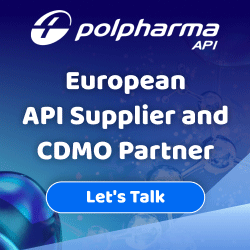Looking for peptide API development services? Find CDMOs offering custom peptide API synthesis, & peptide API contract manufacturing on PharmaCompass.
Q1. What are protein and peptide active pharmaceutical ingredients (APIs)?
Proteins and peptides are biomolecules that are made up of amino acid chains, with the only significant difference being the length of the chain. Proteins generally constitute more than 100 amino acids with a molecular weight greater than 10,000 daltons. Being intricate and large molecules, they serve numerous vital functions within the body. Proteins are essential for carrying out the majority of cellular functions and are required for maintaining the structure, functionality, and control of the body's tissues and organs.
Whereas, peptides are naturally occurring small proteins that can be derived from either animal sources or plant sources. These are short chains that typically comprise 2-50 amino acids linked by chemical bonds known as peptide bonds or amide bonds that form the building blocks of proteins. These pharmaceutical peptides have a molecular weight ranging from 1000 to 5000 daltons.
Each peptide serves a different purpose in the body; some may work similarly to neurotransmitters, some as hormones, and still others may directly affect how the body reacts to an activity or food. Peptides in pharmaceuticals are usually known as therapeutic peptides which contain peptide APIs that are commonly used in the treatment of certain health conditions.
Peptide APIs due to their less complex structures are easily absorbed into the body in comparison to proteins. These are easy to break and quickly penetrate the skin and intestine and become available in the bloodstream more rapidly. Pharmaceutical peptide APIs encompass a wide range of compounds, including antibiotics, hormones, and various substances involved in the biological processes of living organisms.
Both proteins and peptides play a crucial role in retarding the aging process, diminishing inflammation, and eradicating microorganisms but their research, development, and manufacturing is difficult. Therefore, CDMOs play an important role as they possess peptide capabilities for the custom synthesis and manufacturing of peptide APIs.
Q2. What are the various applications of peptide APIs?
Peptide active pharmaceutical ingredients (APIs) have attracted substantial attention and recognition in the pharmaceutical and biotechnology sectors owing to their wide-ranging and dynamic array of uses and applications. These biologically active compounds, consisting of short chains of amino acids, offer unique advantages in targeting specific cellular processes and therapeutic applications.
Peptides play crucial roles in cell signaling, molecular communication, and enzymatic activities in the body. Ranging from conventional drug therapies to cutting-edge diagnostic tools and personalized therapies, peptide APIs are instrumental in managing a variety of medical conditions and healthcare requirements.
Peptide active pharmaceutical ingredients play a substantial role in the therapeutic treatment of various health conditions and are involved in cancer therapy, metabolic therapy, and cardiac and neurodegenerative therapies. Oncology, diabetes, and obesity account for the common therapeutic areas where peptide API therapies are used.
Peptide active pharmaceutical ingredients (APIs) have a broad range of applications in the pharmaceutical and biotechnology industries due to their specificity, versatility, and therapeutic potential. Some of the key applications of peptide APIs include:
Therapeutic Peptides: Peptides can mimic the behavior of a natural ligand, and produce required biological effects. Peptide therapy is commonly used to supplement hormone replacement therapies (HRT) as peptides produce desired results with fewer side effects and long-term benefits, are more precisely targeted, and are safe.
Pain Management Therapy: Synthetic and natural opioid peptides are used as analgesics in pain management therapies.
Cancer Therapy: Tumor-targeting peptides are used in oncology as targeted therapies in the form of monoclonal antibodies via custom protein synthesis.
Cardiac Therapy: Peptides are used as a therapeutic agent in heart failure and certain cardiac conditions. These therapeutic peptides also govern cardiac health, blood vessel tone, and blood pressure.
Neuropeptide Therapies: Neuropeptide-based therapies are utilized in the management of neurological conditions such as neurodegenerative diseases.
GI Peptide-based Therapies: Peptide-based therapeutics for gastrointestinal (GIT) are used in the treatment of short bowel syndrome, IBD, persistent constipation, etc.
Targeted Therapies: Peptide-targeted therapies are designed to engage with precise cellular targets and deliver treatment with precision.
Personalized Therapies: Peptide-based therapies can be personalized for individual patients as per their genetic profiles.
The utility and application of peptide APIs are continuously broadening as researchers unveil novel therapeutic targets and design inventive peptide-driven therapies. Their adaptability, versatility, target-specificity, and precision make them valuable tools within the pharmaceutical and biotechnology domains. Thus, the market for peptide development is expanding due to their vital applications in molecular biology, biochemistry, immunology, and medicine, including peptide vaccines, cell-penetrating peptides, peptide supplements, etc.
Moreover, tumor-targeting peptides are gaining more importance due to the raised demand for cancer therapies, and therefore the research in the peptide development field has increased in recent years. Thus, contract research organization (CRO) and CDMO peptide API development companies are focusing on researching and developing these APIs and providing peptide synthesis services.
Q3. What emerging trends and technologies are shaping the future of peptide research and development?
The peptide synthesis market is experiencing growth primarily due to the rising utilization of peptides in pharmaceutical treatments, increased research efforts, and the advancement of automated peptide synthesizers. Peptide molecules have garnered substantial attention in the fields of healthcare and nutrition, with notable progress observed in enzymatic and chemical methods of peptide production.
Peptide APIs are finding increased therapeutic usage in the treatment of obesity, metabolic syndromes, and diabetes. Additionally, these are also utilized in cancer, chronic pain, HIV infections, multiple sclerosis, and osteoporosis.
The field of peptide research and development is rapidly evolving, with several emerging trends and technologies shaping its future. The peptide API development and manufacturing is an intricate process involving sophisticated technology and expertise. These advancements are impacting the design, synthesis, and application of peptides across various fields. Some of the key trends and technologies in the complex peptide API development include:
Peptidomimetics: Peptidomimetics mimics peptides' structure and function while enhancing stability and pharmacokinetics, and reducing the risk of proteolysis resistance. These broaden the scope of peptide development as potential drugs and therapies.
Conjugated Peptides: Peptide conjugation with other peptide APIs or small molecules, promotes better drug delivery, bioavailability, target specificity, antigenic immune response, and cellular uptake.
Oral Peptide Delivery: Researchers are investigating inventive approaches to enhance the effectiveness of orally administering peptides. This encompasses the peptide development strategies and delivery techniques to address stability and bioavailability challenges.
Cyclic and Constrained Peptides: Cyclic and constrained peptides provide improved stability and target-binding characteristics, making peptide APIs valuable candidates for peptide drug development.
Peptide Libraries and Screening: Peptide libraries are structured combinations of a wide range of peptides, extensively employed for screening targets in well-established research domains such as immunotherapy, vaccine design, drug investigation, and proteomics.
Immune Checkpoint Inhibitor Peptides: Immune checkpoint inhibitor peptides are gaining prominence in the peptide development field due to their potential to revolutionize cancer immunotherapy.
Peptide-Based Vaccines: Peptide-based vaccines are also being used in treating cancer and infectious diseases. These vaccines leverage specific peptide sequences to stimulate immune responses and therefore revolutionizing the peptide development market.
Advanced Manufacturing Technologies: Advancements in peptide development and production techniques, such as solid-phase peptide synthesis and continuous-flow processes, enhance efficiency, cost-effectiveness, convenience, and scalability.
These trends and technologies play a pivotal role in the growing influence of peptide APIs in drug exploration, diagnostics, personalized medicine, and multiple industrial sectors. These offer the potential to introduce innovative, precise, and efficient peptide-based treatments to the forefront of healthcare and biotechnology. The CDMO peptide API development offers end-to-end peptide capabilities including peptide development, synthesis of peptides, and contract peptide API manufacturing for commercial scales.
Q4. What are the leading CDMOs offering peptide development services?
Various pharmaceutical organizations, such as contract development and manufacturing organizations (CDMOs) and contract research organizations (CROs) are equipped with peptide API development and manufacturing facilities. These organizations offer custom peptide synthesis services ranging from development to commercial peptide manufacturing.
The peptide API development and manufacturing market is complex and composite, with many players involved in custom peptide synthesis services. The peptide API development and peptide drug development require meticulous attention to detail and extensive testing with stringent quality standards. Therefore these CROs and CDMOs have required capabilities for safe and effective peptide therapeutics and peptide API development.
The CROs and CDMOs for peptide API support pharma companies at all stages from R&D to clinical and commercial peptide manufacturing. These leading CDMO peptide API suppliers have several years of experience in peptide therapeutics contract API manufacturing and development. Some of the top CDMO peptide API development with custom peptide services are mentioned below:
Aurigene Pharmaceutical Services: Aurigene Pharmaceutical Services is a CDMO peptide API development organization that provides support from discovery to complex peptide API development. It offers a wide range of CDMO custom peptide synthesis services, such as peptide API development through solid phase synthesis, solution phase synthesis, and hybrid peptide synthesis.
CBL: CBL is a global custom peptide synthesis and peptide manufacturing company. It is a CDMO peptide API supplier that offers peptide development and peptide synthesis along with contract peptide API manufacturing and solid-phase organic synthesis.
Pfizer CentreOne: Pfizer CentreOne is a CDMO peptide API development company that has expertise in designing peptide therapeutics. It offers peptide development, synthetic peptide API manufacturing, and peptide synthesis services. It is also involved in peptide therapeutics contract API manufacturing and peptide drug development for lipoproteins, mAbs, BsAbs, etc.
Prague Scientific: Prague Scientific is a CDMO peptide API development that offers custom peptide services for the synthesis of peptides and oligonucleotides. It is also a contract manufacturer with peptide capabilities including custom synthesis and contract peptide API manufacturing.
Bachem: Bachem is a CDMO peptide API supplier that offers peptide development and synthetic peptide API manufacturing. Its custom peptide synthesis services include peptide therapeutics contract API manufacturing and peptide drug development.
Aspen API: Aspen API is a CDMO that offers custom peptide services such as the synthesis of peptides and synthetic peptide API manufacturing. It provides services for peptide API development and up-scaling of high potency APIs (HPAPIs), complex peptide APIs, and narcotics.
All Suppliers












 Aurigene is a global leader in accelerating drug innovation through discovery, development & manufacturing.
Aurigene is a global leader in accelerating drug innovation through discovery, development & manufacturing.



















